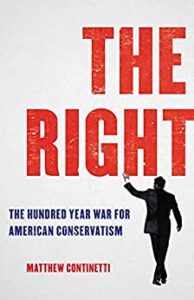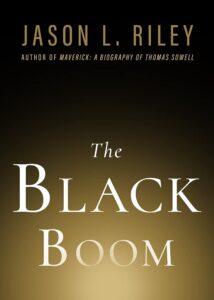
The Right: The Hundred-Year War for American Conservatism, by Matthew Continetti (Basic Books; 484 pp., $32.00). Although Matthew Continetti announces his intent “to describe how the varieties of American conservatism differed from another” over the last 100 years, his chief concern is the tension between populism and elitism among Republicans. His theory is that the success of a political movement depends on both its appeal to the people and its nod to the elites as those who are best able to carry out “the accepted way of doing things.”
Continetti sees the right in disarray ever since the economic crash of 2008, which marked the end of George W.’s second term. By 2012, he wonders blithely, “How had [conservative] matters long-thought settled—the importance of markets, the benefits of free trade, the blessings of immigration, the necessity of war—become so hotly contested?” These assumptions about the “settled” tenets of conservatism make more sense if you know that Continetti is a senior fellow at the American Enterprise Institute and the son-in-law of Bill Kristol.In other words, he is a made man in the neoconservative mob.
Continetti thus scratches his head at right-wing populism and furrows his brow at the list of politicians over the last century who came to power by appealing to the masses rather than through institutional pedigree. The list includes figures like Charles Lindbergh, Joe McCarthy, Pat Buchanan, Ron Paul, and, of course, Donald Trump. For Continetti, populist movements are extremist by nature, and the people who comprise those movements succumb, almost by necessity, to “conspiracy theories, racism, and anti-Semitism.” They have even “flirted with violence,” he says, which of course hearkens to the Jan. 6 “insurrection,” on which Continetti focuses in the book’s penultimate chapter, “The Viral President.” (Guess who.)
If you are merely trying to follow the fate of the hapless GOP as it stumbles its way through the latter part of the 20th and early part of the 21st centuries, this book may prove useful. But is the GOP to be equated with “the right”? Continetti seems to treat them as such, especially near the end when he laments that “[u]ntangling the Republican Party and conservative movement from Donald Trump won’t be easy.” True enough. And neither will it be easy to untangle true conservatism from neoconservative elites.
(Michael Larson)

The Black Boom, by Jason Riley (Templeton Press; 176 pp., $12.95). The left’s view of the place of blacks in American society is patronizing and destructive. At its core is a conception of blacks as incapable of making their way in the world without massive state largesse and lowered standards for qualification. Blacks are thus wholly absolved of any responsibility for the predictable consequences of their actions by the mantra “racism.”
Jason Riley rejects that view, and he is certainly right in doing so. The strongest part of this slim book is the discussion of how familial dissolution handicaps black economic performance. Single parenthood is correlated with elevated crime and substance abuse rates and lowered educational achievement, all of which leads to lowered economic success.
The book’s argument is fatally wounded, however, by its author’s libertarian economics. Riley spends many pages claiming that black labor participation is not hindered by immigration. But this is hardly the most accurate way of evaluating the effect of immigration on the black situation.
A much better data point is wage levels. Harvard’s George Borjas makes the case that benefits from immigrant labor go almost entirely to two groups: the immigrants themselves and their employers. Those competing in labor markets with the immigrants are disadvantaged. Low-skilled Americans (among whom blacks are disproportionately represented) are negatively affected by significant numbers of low-skilled immigrant workers. Riley acknowledges the evidence of this effect, but claims it is “relatively small.” Curious readers are directed to chapter seven of Borjas’ We Wanted Workers, wherein the author uncovers the efforts of many writers such as Riley to methodologically hide and minimize what is in fact a significant effect.
Riley’s libertarian blind spot extends to the broader question of material inequality. He rejects minimum wage laws as, like restrictions on immigration, policies that make economies “less flexible.” He does not acknowledge that this level of economic flexibility benefits the ultra-wealthy much more than those at the bottom. If inequality grows enough, it provides the wealthy with the tools to effectively disenfranchise the rest of us. A nationalist conservatism understands that the wealthiest Americans must be made to understand that their own interests are tied up with the interests of their co-citizens.
As I was talking with a friend the other day about this last question, he remarked: “Some people are so rich they can build their own spaceships. In a political system in which money is so important, how can smart people not understand that the rich will have much more power than the rest of us?” It’s a good question.
(Alexander Riley)

Leave a Reply